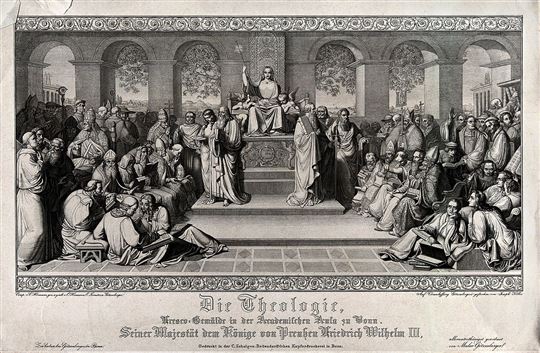
Free Not to Be Neutral
A father’s challenge, bringing suit against the state of Québec, where, by law, Ethics and Religious Culture are taught. Supposedly “neutral” lessons seek to neutralize parents and libertas Ecclesiae. What is the source of the defense of education?On June 8th, I found myself before a judge as a co-plaintiff in the case of Loyola High School and John Zucchi vs. the Québec Minister of Education, Leisure and Sport. In my testimony, I explained that I did not want my son, a student at the school, to take a course in which his teachers would be bound by the government to suppress their faith convictions for one class during the day. I explained to the judge that such a restriction was not only excessive but also contrary to good pedagogy.
I was referring to the new program in Ethics and Religious Culture (ERC). In September 2008, Quebec students were introduced to ERC as a new educational project for a pluralist society. Students are not taught religion, but “religious culture,” and ethics is not to be “confused” with morality. Teachers are to have a “neutral” perspective in the classroom so that students can develop their own positions independently. All students must take the course from the first year of elementary school to the end of high school.
The background to the program goes back fifty years. The Church had been a powerful presence in Québec; schools, hospitals, and social services were largely under its control. The “Quiet Revolution” of the 1960s ushered in a period of modernization in which the State, its bureaucracy, and a new nationalism replaced the overarching presence of the Church.
In the mid-1990s, the Québec government “deconfessionalized” the school system. Canada’s Constitution protected confessional schools in Québec. In 1997, with the acquiescence of the Québec Assembly of Catholic Bishops, the Québec government obtained a constitutional amendment from the Federal Government. Government-funded public Catholic and Protestant schools in Québec were no longer guaranteed protection, even if they continued to exist for ten years at the sufferance of the government.
In the name of pluralism. In 2005, Quebec hurriedly passed an amendment to the Québec Charter of Rights. Section 41, which upheld the rights of parents over the religious education of their children, was amended so that the State could enter this realm if it were in the “child’s interest.” The intention was to make it difficult for parents to obtain an exemption from the future ERC program.
ERC proponents spoke of it as filling a void left by the end of confessional schools. The State had to replace religious education with a program in ethics and religious culture.
In its planning stages, the program was publicized as a way to make children literate in ethical systems, world religions, and the religious heritage of Québec. Many people were seduced by it, Catholics in particular. In the CL community in Montreal, we began discussing the issue a couple of years ago. On one occasion, we had a seminar with Paul Donovan, the dynamic principal of Loyola High School in Montreal, who has argued against the Ministry’s restrictions in a passionate and reasonable way. It soon became clear to us that there were two grave problems at stake: faith no longer mattered as a way of approaching life and therefore knowing reality and, as a result, our society no longer had a true understanding of education.
I personally became involved in the question through a friendship with a number of colleagues from my university and from Loyola, which my son, Thomas, attends. Two things bothered me about the program. First, its so-called neutral stance: this means that in the teaching of ethics, for example, a teacher cannot express a position on an ethical issue. Either the question under consideration is resolved by recourse to the laws of the State or the Charter of Rights of Québec, or else the teacher must expose various ethical positions so that students can reflect on them and somehow find their way. Such an approach is entirely unreasonable and counter-pedagogical! Secondly, the compulsory aspect of the course: given its perspective, this goes against the religious rights of parents who, sending their children to a private Catholic school, expect a Catholic perspective.
Loyola High School in Montreal and I, as a parent, filed a motion against the Minister of Education last September. Loyola (whose alumni, incidentally, include the theologian Bernard Lonergan and Jean Vanier) did not request an exemption but asked the ministry to accept a program it has long taught as an equivalent replacement for ERC. The Minister refused. The only fundamental reason given was that the Loyola program was taught from a Catholic and Jesuit perspective. Even though Loyola met the objectives of the Ministry’s program–the recognition of others and pursuit of the common good–it did not do so from a so-called “neutral” standpoint.
The Québec Bishops’ Conference had to weigh in on these issues. In 2008, the Conference wrote a letter pointing to the shortcomings of ERC but affirming that its objectives were good and encouraging the faithful to have their children comply. The bishops stated that they would monitor developments for five years and then make an assessment. Effectively, politicians and ministerial bureaucrats got the blessing they were seeking to neutralize “intransigent” Catholic parents.
The letter and the Bishops. On May 5th, Cardinal Grocholewski of the Pontifical Commission on Catholic Education issued a letter dealing with the teaching of religious culture and ethics in the schools. “In a pluralist society,” the document stated unambiguously, “the right of religious freedom demands both the assurance that religious education be offered in the schools, and the guarantee that this teaching be in conformity with the convictions of the parents” (par. 11). It also warned that the teaching of ethics and religious culture from a “neutral” perspective could be confusing to a student. 
Our case went to court from June 8th to June 12th. While there were a number of wide-ranging arguments and presentations from key witnesses, our main request was that Loyola be allowed to teach the program from a Catholic stance. Neutrality is also a perspective. As I told the court in my testimony, as a professor, I cannot be neutral in the classroom and I don’t expect that from my students. I don’t even know what that means. To be neutral, my students would either have to be asleep or completely lost in the course. The judge will render a decision in the following months.
What have I learned from this experience? First, our demand is not the struggle of fanatics who want to carve out their piece of the world. It is a battle that upholds freedom and democracy itself. In no other course in any other subject is a teacher told that he or she cannot have a perspective. The principle of libertas ecclesiae is fundamental for freedom in a democracy. In The Religious Sense, Father Giussani asserts that “[r]eligiosity is the single hindrance, limit, confine to the dictatorship of man over man, whether we are referring to men and women, parents and children, government and citizens, owners, workers, party chiefs, and rank and file” (p. 92). Our lawyer, Mark Phillips, argued that the objective of ERC was to complete the deconfessionalization of the Québec school system and to extend its grasp to private religious schools. How far, he asked, can the State extend its program of laicité? Indeed, in the name of diversity and pluralism, do we suppress a religious voice, and thus what is truly diverse?
Hope in the Courtroom
Second, if we don’t start from a position of faith lived with awareness, we quickly lose sight of the real issues. Québec had a rich Catholic tradition but even in the 1950s when the Church here appeared to be at its heights, it was already depending on the old touchstones, and such a dependence lived without the awareness of a relationship only leads to uncertainty, as Father Carrón reminded us at the recent Spiritual Exercises. Our only hope is to be aware that we have met something truly new, the Christian event. We can’t go back to the “ancient certainties” or dream up social plans and projects. We need a relationship with something–Someone–truly new that surprises us. It is our only hope for the Church and for all of Québec society, for a true education, freedom, and democracy.
As I left the courtroom at the end of the trial, I had a deep sense of gratitude to have participated in this event that allowed me to testify to what I hold most dear. It was clear to me that this was a privilege, a gift that the Mystery gave me in order that He might be more evident to me and to the world.